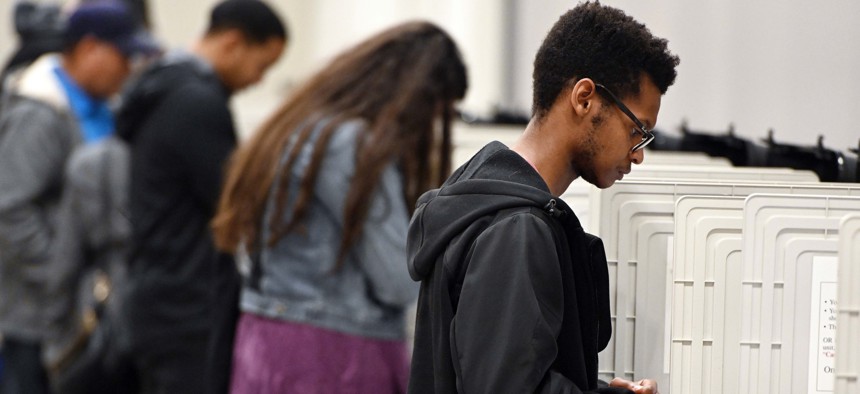Georgia Can Use Current Voting System for 2019 Elections, Judge Rules

In this Oct. 27, 2018 file photo, people cast their ballots ahead of the Nov. 6, general election at Jim Miller Park in Marietta, Ga. AP Photo
But the state will need to put a backup system in place for the 2020 presidential primaries in case new voting machines are not ready by March.
A federal judge will allow Georgia to use its much-criticized voting systems for this fall’s municipal elections, but ordered Thursday that the system could not be used for the 2020 presidential primaries.
Voting-rights organizations had asked U.S. District Court Judge Amy Totenberg to force the state to use paper ballots that could be marked by hand during the 2019 municipal elections. While rejecting that request, the judge forbid the state from using its direct recording electronic voting machines beyond this fall, saying that if the planned new system is not in place by the March 2020 primaries, the state cannot fall back on the old one.
Direct recording electronic voting machines are considered to be more vulnerable to hacking and Georgia's current machines don’t produce a paper trail that can be audited.
Totenberg expressed concerns that Georgia won’t succeed in getting the planned new system working in time for the primaries, ordering that a contingency plan be put in place. The judge also wrote that the Georgia Secretary of State’s office will need to take action to “address the significant deficiencies in the voter registration database.”
“This case arises in a technology context where Georgia’s current voting equipment, software, election and voter databases, are antiquated, seriously flawed, and vulnerable to failure, breach, contamination, and attack,” the judge wrote.
In her 151-page order, Totenberg noted the widespread complaints in Georgia during the contentious 2018 governor’s election, which included allegations that touchscreen voting machines switched voters’ choices to other candidates. Problems with machines also created long lines at some polling places, she wrote.
Totenberg has been considering lawsuits over the state’s voting machines since before that election, deciding in September 2018 that she wouldn’t force state and county election officials to use paper ballots. Still, in the 2018 ruling the judge was highly critical of the state’s system, while saying state officials weren’t taking seriously its vulnerabilities.
Earlier this year, the Georgia legislature voted to buy new systems, which will include touchscreen machines that print paper ballots. The $107 million contract with Dominion Voting will buy 30,000 new machines, the Atlanta Journal-Constitution reported.
Secretary of State Brad Raffensperger said in a statement that the office is still reviewing the judge’s order, but is pleased that the 2019 elections won’t be disrupted. The new voting system will be in place by the 2020 primaries, he said.
“These activist plaintiffs continue fruitlessly attempting to force their preferred policy outcomes on Georgia voters without success. While we fully expect these activists and their attorneys to incessantly use scare tactics to try to undermine Georgia elections, their own experts admitted under oath that there is no evidence of Georgia’s voting machines ever being compromised or not accurately counting the votes of our citizens,” Raffensperger said.
Lawyers for the plaintiffs also praised the decision. Kristen Clarke, president and executive director of the Lawyers’ Committee for Civil Rights Under Law, one of the organizations that had sued, heralded Totenberg’s decision as “historic.”
“The court’s opinion reveals in detail the flaws in the state’s present system of balloting that threaten the franchise in Georgia,” she said in a statement. “The court also underscores the cavalier attitude that state officials had toward the problems with the DRE system in recent years.”
Laura Maggi is Managing Editor for Route Fifty.
NEXT STORY: Kids With Lead Poisoning Will Get Early Help in These States






